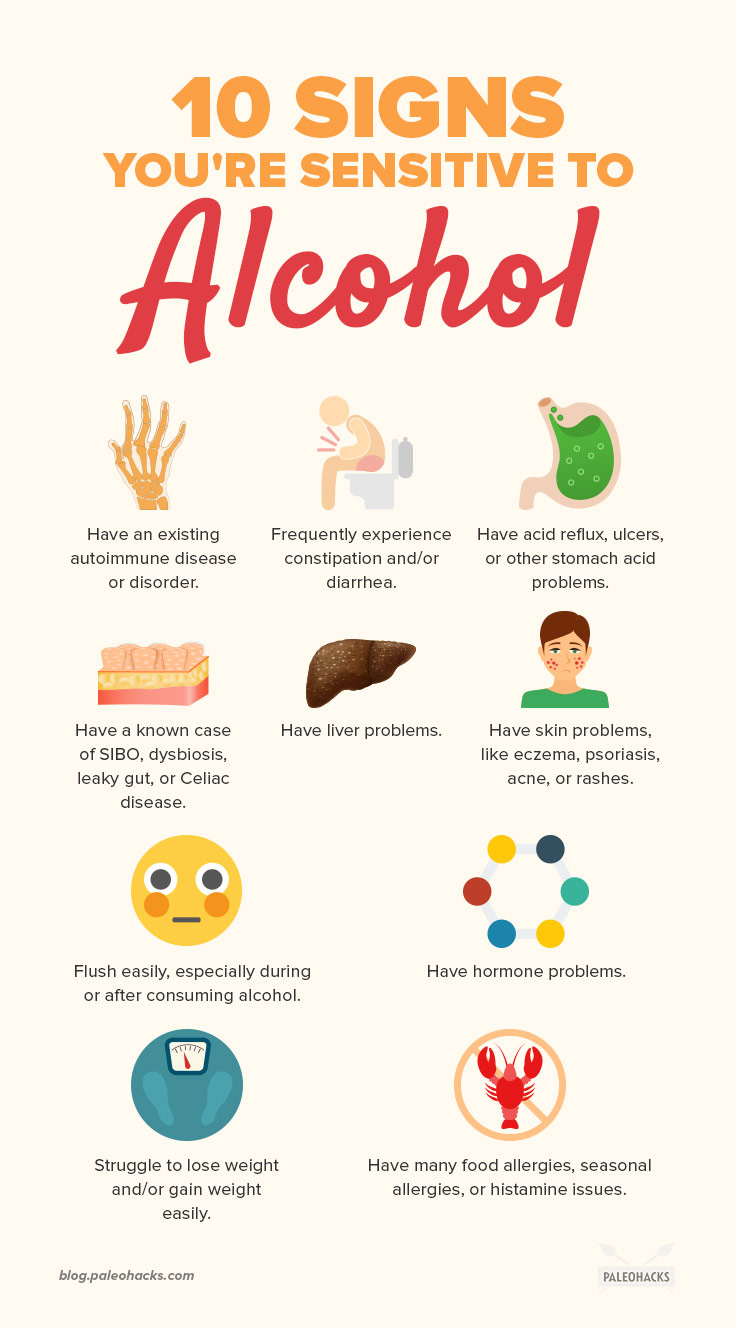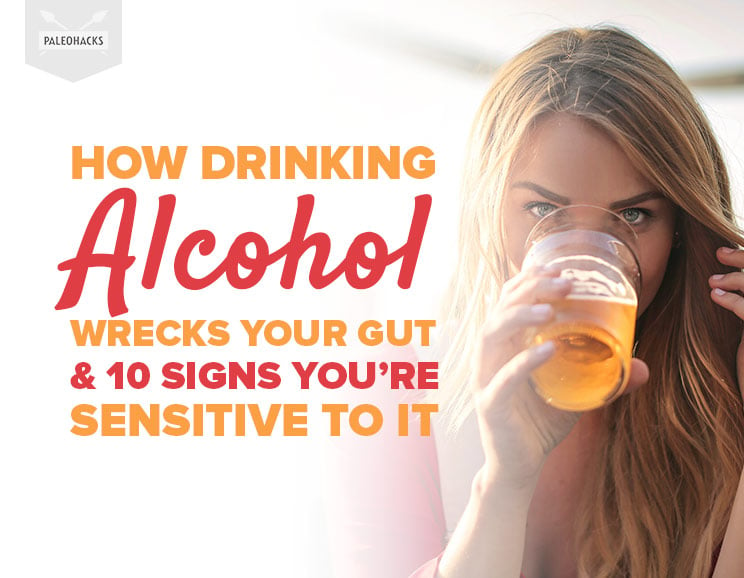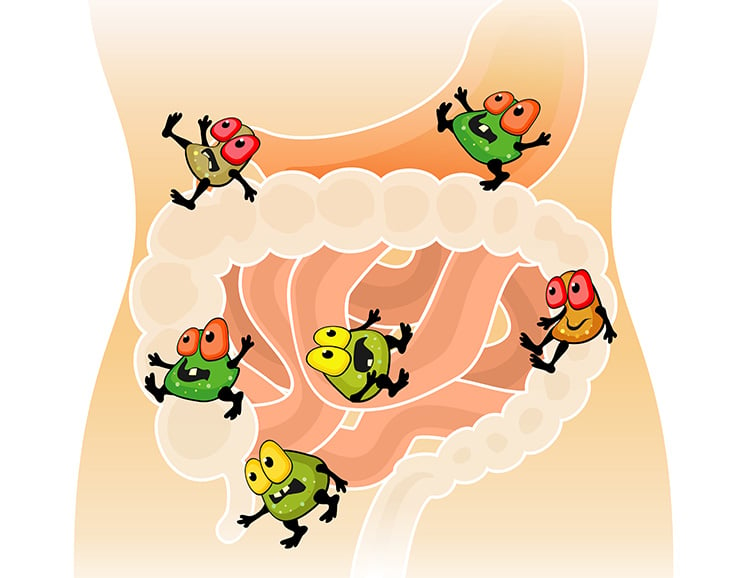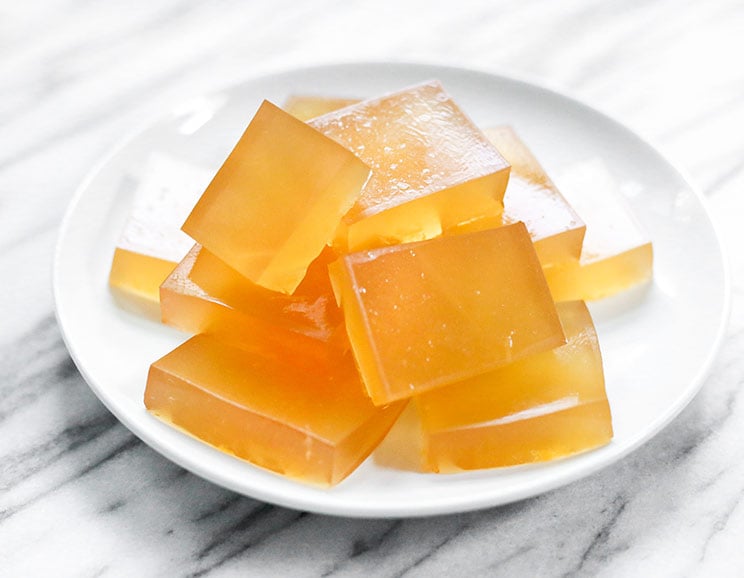Alcohol can be a sensitive subject, but did you know that it can also cause major gut sensitivity problems?
Even if you’re following a Paleo diet and sticking to caveman-friendly booze, alcohol might not be your gut’s best friend. Here’s how to know whether it’s at the root of your health problems or digestive woes.
How Alcohol Affects the Gut
The gut contains more than 100 trillion bacteria, and this bacterial population is collectively referred to as the microbiome. Without a healthy gut, numerous other areas of our health will suffer, including but not limited to: (1, 2, 3, 4)
Do you struggle with bloating, gas, constipation, or other digestive issues? We’ve created a FREE guide to healing your gut naturally.
Click here to get your FREE copy of our Digestion Guide!

- Immunity, reduced or autoimmunity
- Nervous system
- Increased risk for diabetes and metabolic syndrome
- Increased risk for cancer
- Cardiovascular system
- Thyroid and metabolism
- Liver and detox outlets
- Joints and tendons
- Digestion and elimination (risk for intestinal conditions and infections)
- Stress hormones and adrenal gland problems
Countless diet and lifestyle factors can positively and negatively impact gut health and, often, we only give thought to it when we’re noticing life-altering symptoms. Hundreds of different varieties of bacteria live in the gut, some of them “good” and some of them “bad”, with the bad bacteria having a hand in many unpleasant symptoms, side effects, and chronic conditions.
When the bad bacteria outnumber the good, this is referred to as “dysbiosis,” or an imbalance in gut bacteria symmetry. We need more good bacteria to flourish than bad bacteria. (5, 6) [tweet_quote]Drinking alcohol can have a profound effect on the gut and can influence what kind and how many bacteria live there.[/tweet_quote]
Drinking alcohol can have a profound effect on the gut and can influence what kind and how many bacteria live there. Even a single episode of drinking can damage the gut wall and can also lead to malabsorption of essential vitamins and minerals. (7)
In studies, research shows that people who regularly drink alcohol, including to excess, have guts that look very different to those of people who drink little to no alcohol. (8) Alcohol can also lead to a leaky gut, and can interfere with how the immune system functions, leading to increased inflammation within the gut and elsewhere in the body. (9, 10)
People who regularly consume alcohol or are prone to dependence on alcohol will typically have a gut-brain relationship that is strongly influenced by how alcohol alters the bacteria in the microbiome. (11) Regular alcohol consumption can lead to leaky gut and low-grade chronic inflammation, which in turn can target other organs in the body, leading to autoimmunity, chronic conditions, or even alterations to the central nervous system and how the brain works. (12)
Even a single episode of binge drinking (five or more drinks for men, or four or more drinks for women in the space of two hours) can increase endotoxins in the blood, which are associated with the bad bacteria that can not only disrupt the gut, but can also lead to liver problems, autoimmunity, and other chronic conditions. (13)
So what’s the takeaway? Alcohol, while it can seem harmless if you’re only sporadically consuming it, can have a major impact on the gut. Genetics can play a role in just how sensitive you are, as well as other lifestyle and health factors (people who already have existing autoimmune, gut, or chronic conditions should be more cautious than those who don’t already have these issues). While alcohol certainly isn’t “all bad”, it’s essential, as with any other food or beverage, to assess how it’s impacting your body and whether it’s good or beneficial for you.
10 Signs You Might Be Sensitive to Alcohol

If you’re not sure whether you could be sensitive or susceptible to alcohol-related gut problems, consider the following signs, symptoms, and conditions:
- You have an existing autoimmune disease, disorder, or other chronic health problem (including thyroid, adrenal, intestinal, digestive, or metabolic).
- You frequently experience constipation and/or diarrhea.
- You have acid reflux, ulcers, or other stomach acid problems.
- You have a known case of SIBO, dysbiosis, leaky gut, or Celiac disease.
- You have liver problems.
- You have skin problems, like eczema, psoriasis, acne, or rashes.
- You flush easily, especially during or after consuming alcohol.
- You have hormone problems.
- You struggle to lose weight and/or gain weight easily.
- You have lots of food allergies, seasonal allergies, or histamine issues.
6 Benefits of Cutting Alcohol for 30 Days or Longer

If you suspect that you could be sensitive to alcohol, either based on the symptoms above or your own intuition, there’s zero harm in cutting it out of your diet for at least 30 days. Longer is ideal if you already have existing gut problems, autoimmunity, or other chronic disorders.
1. Better Hormone Balance
Alcohol can so dramatically alter the landscape of the gut that it can also have a profound impact on certain hormones, especially reproductive hormones and thyroid hormones. It can increase estrogen levels, which can further complicate estrogen dominance problems (like with PCOS) or progesterone deficiency. (14)
Moderate alcohol consumption can even have the potential to harm fertility, especially as it relates to progesterone, or the pregnancy hormone. (15) Of course, we know it’s bad to drink while pregnant, but progesterone plays an essential role in healthy ovulation and the second phase of the menstrual cycle, the luteal phase where conception occurs.
Moderate alcohol consumption can even reduce testosterone levels in men, potentially reducing fertility as well. (16)
2. Reduced Inflammation
Anything that alters gut bacteria negatively is also going to increase inflammation. Moderate to heavy alcohol intake, and perhaps even less in sensitive individuals, can lead to increased inflammatory markers, like c-reactive protein, which many doctors use as a measure for a cardiovascular risk. (17)
Beyond just cutting alcohol, increasing gut-friendly foods, like fermented vegetables, collagen, bone broth, and leafy green vegetables can also help reduce inflammation.
3. Better Immunity
Quitting alcohol can help boost the body’s natural defenses by preventing bad bacteria from ruling the gut. (18) Alcohol can also blunt the immune system’s ability to rapidly mount an attack against viral invaders, leading to a depressed immune system and increased infections and illnesses. (19)
In people who already have a suppressed or malfunctioning immune system, like those with autoimmune disease or chronic disorders, alcohol can further worsen the condition by complicating gut bacteria balance.
4. Fewer Chronic Gut Problems

Alcohol can suppress the good gut bacteria while helping the bad to proliferate. Even just moderate alcohol intake is associated with SIBO, or small intestinal bacterial overgrowth. (20) SIBO can produce a host of unpleasant symptoms, like bloating, abdominal pain, and diarrhea, and is a bacterial condition that can take years to undo.
Even without SIBO, alcohol can irritate the gut and lead to bouts of diarrhea or constipation, or both, which can cause painful intestinal cramping, urgency, and foul smelling gas.
5. Fewer Cravings
Even small amounts of alcohol can lead to cravings for more, thanks to bad bacteria that are fueled by its presence. The same can be said for sugar cravings, which are also closely associated with alcohol intake. (21) While eliminating alcohol won’t get rid of every single craving, it’s a good starting point to help normalize and balance intestinal bacteria, which do have a large say in what cravings get sent to the brain.
Alcohol intake can also disrupt blood sugar, leading to hyper or hypoglycemia in sensitive individuals. This can also lead to glucose-driven cravings as the body seeks to find balance for insulin and blood sugar levels. Cutting booze can decrease this rollercoaster effect.
6. Improved Detox and Liver Function
Alcohol is well-known for its damaging effects on the liver, but only in people who are alcoholics for a long time. However, you don’t have to be a lifelong alcoholic to experience liver problems from alcohol intake. Alcohol’s impact on gut bacteria can allow damaging bacteria to thrive, including types that can actually hurt the liver itself. (22)
An inefficient, inflamed, or damaged liver puts the whole body at risk of further health problems since toxins that aren’t removed by the liver remain in circulation throughout the bloodstream, with the potential to ignite chronic health issues and even cancer. Without alcohol for the liver to metabolize, your liver can efficiently do its job of collecting and removing toxins from the body.
Bottom line: While alcohol isn’t all bad, it can have a devastating effect on gut health, which in turn, can take its toll on the entire body. Sensitive individuals can benefit from strict moderation and even avoidance of alcohol, as well as living a gut-friendly lifestyle, to ensure that their microbiome is stocked with more good bacteria than bad.

(Read This Next: Alcohol – The Best and Worst to Drink)



 Paleo ‘PayDay’ Bars Recipe
Paleo ‘PayDay’ Bars Recipe









Show Comments